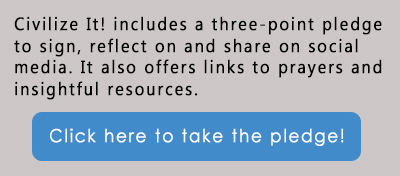
This year, the American bishops have partnered with Salt and Light to create an exciting and user-friendly initiative called Civilize It: Dignity Beyond the Debate. The bishops encourage us to “strive to understand before seeking to be understood, to treat with respect those with whom we disagree, to dismantle stereotypes, and to build productive conversation in place of vitriol,” where we live, work, and worship.

Do you know what the seven themes of Catholic Social Teaching are?
They offer a firm foundation to help inform your conscience1. Life and the Dignity of the Human Person
As Catholics, we believe that every person is precious, that people are more important than things, and that the measure of every institution is whether it threatens or enhances the life and dignity of the human person.
2. Call to Family, Community, and Participation
How we organize our society — in economics and politics, in law and policy — directly affects human dignity and the capacity of individuals to grow in community.
3. Rights and Responsibilities
Every person has a fundamental right to life and a right to those things required for human decency. Having rights means we also have duties and responsibilities — to one another, to our families, and to the larger society.
4. Option for the Poor and Vulnerable
The Catholic bishops of the United States tell us that building a just economy that works for all encompasses a wide range of issues, including food security and hunger, work and joblessness, homelessness and affordable housing, and tax credits for low-income families. It also means protecting programs that serve poor and vulnerable people throughout the federal budget.
5. The Dignity of Work and the Rights of Workers
Work is more than a way to make a living; it is a form of continuing participation in God’s creation. The basic rights of workers must be respected including the right to productive work, to decent and fair wages, to the organization and joining of unions, to private property and to economic initiative.
6. Solidarity
We are our brothers’ and sisters’ keepers, wherever they may be. Loving our neighbor has global dimensions in a shrinking world. At the core of the virtue of solidarity is the pursuit of justice and peace. Pope Paul VI taught that if you want peace, you must work for justice. The Gospel calls us to be peacemakers. Our love for all our sisters and brothers demands that we promote peace in a world surrounded by violence and conflict.
7. Care for God’s Creation
Care for the earth is not just an Earth Day slogan, it is a requirement of our faith. We are called to protect people and the planet, living our faith in relationship with all of God’s creation. This environmental challenge has fundamental moral and ethical dimensions that cannot be ignored.
Credit: United States Conference of Catholic Bishops @ 2005
Find helpful information and resources about each of these themes at:
www.usccb.org/beliefs-and-teachings/what-we-believe/catholic-social-teaching/seven-themes-of-catholic-social-teaching
Links to additional resources
Forming Consciences for Faithful Citizenship can be found at:
www.usccb.org/issues-and-action/faithful-citizenship/forming-consciences-for-faithful-citizenship-title
This is the central document, written by the bishops of the United States, to help American Catholics form their consciences through a greater understanding and embracing of their rights and duties regarding participation in civil life.
Visit www.usccb.org/prolife/abortion for links to factual, legal and scientific information as well as church teaching resources to help you understand why the bishops continue to declare respect for the dignity of human life is the highest priority for Catholic citizens.
Education has been a priority of the American bishops for generations. In 2005, they updated their thinking on the subject in a document called Renewing Our Commitment to Catholic Elementary and Secondary Schools in the Third Millennium. Find it here:
www.usccb.org/beliefs-and-teachings/how-we-teach/catholic-education/upload/renewing-our-commitment-2005.pdf
To read Laudato Si’ and to access other resources exploring a Catholic perspective on the environment, including prayers, visit the U.S. Conference of Catholic Bishops webpage on Environment and Environmental Justice at
http://www.usccb.org/environment
A Framework for Comprehensive Health Care Reform, first published by the USCCB in 1993, remains the basis of much thinking on this topic. Find it at www.usccb.org/issues-and-action/human-life-and-dignity/health-care/upload/health-care-comprehensive-care.pdf
Welcoming the Stranger Among Us: Unity in Diversity, is an excellent place to begin exploring the many nuances on the subject of immigration. Find the entire document, published in 2000 by the USCCB, at https://www.usccb.org/committees/pastoral-care-migrants-refugees-travelers/welcoming-stranger-among-us-unity-diversity#church
A Place at the Table, a pastoral reflection on poverty by the bishops of the United States, considers a Catholic recommitment to overcome poverty and to respect the dignity of all God's children. The full document can be found at www.usccb.org/resources/place-table
The full text of Open Wide our Hearts, the 2018 letter authored by the bishops of the United States that explores and explains Catholic teaching on racism, can be found here: www.usccb.org/issues-and-action/human-life-and-dignity/racism/upload/open-wide-our-hearts.pdf
For insights into the status of religious liberty in America from a Catholic perspective, find A Statement on Religious Liberty by the United States Conference of Catholic Bishops Ad Hoc Committee for Religious Liberty at
https://www.usccb.org/committees/religious-liberty/our-first-most-cherished-liberty
Election 2022: A guide for Catholics in the Diocese of Erie as they prepare to vote, acknowledges the United States Conference of Catholic Bishops and Faith Catholic, based in Lansing, Mich., as the basis for much of the material made available in this guide.
